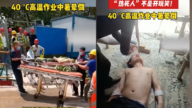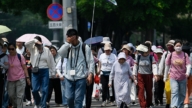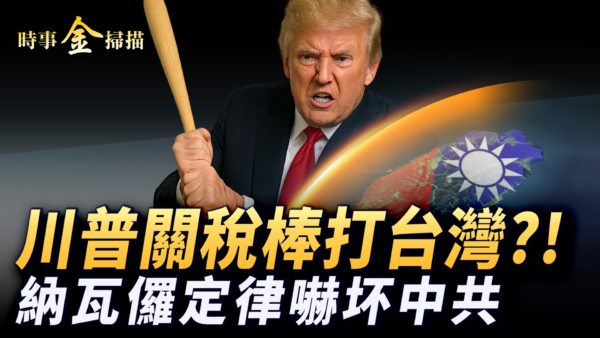【新唐人2013年07月08日讯】长期以来,中共的政法系统对民众的暴力“维稳”,造成社会民怨沸腾,也让中共政权危机四伏。日前,广东省高级人民法院院长对外表示,绝大多数司法不公是因为“司法不独立、司法行政化”。那么我们就来看看,这“司法行政化”的背后到底是什么?
中共总书记习近平上台后,曾一再表示要反对执法不公、严惩司法腐败。随后,政法系统出现地震,各地政法官员纷纷落马或者自杀。但大陆司法黑暗并没有因此改观,访民、异见人士仍然被随意抓捕判刑,普通民众的正常权利根本没有保障,而特权阶层依然逍遥于法律制裁之外。
大陆媒体《中国新闻周刊》最近报导,广东法院系统正在推行一系列所谓“去行政化”的改革措施。其中深圳福田区法院、佛山中院开始试行审判长负责制,希望借此来排除行政权力对审判的干扰。
报导援引广东省高级人民法院院长郑鄂的话说,司法改革重心必须转向体制改革,这迫切要求顶层设计。他表示,绝大多数司法不公并不是因为司法腐败,而是司法行政化。
对此,中国法律专家、北京市律师协会“宪法人权委员会”委员杨学林,向《新唐人》分析指出,司法腐败肯定是司法不公的一个原因,但是司法腐败的根源还是体制问题。
中国法律专家 杨学林:“就是司法不独立、法官不独立,受到的这种行政干预太多。它必然会导致司法腐败。其实就这么简单。”
据了解,“去行政化”改革并不是一个新的观点。多年前,中国法律界人士已经对此达成共识,并进行了持续不断的呼吁。但改革的困难点在于﹕在中国社会现有体制下,党委、政府干预案子的现象十分普遍。
大陆南京“东南大学”法学教授 张赞宁:“最主要的机制就是:宪法上有一句话‘中国共产党领导’。而且专门成立了一个‘政法委’,来领导公检法的工作、审判工作,这是造成司法不独立的一个根本原因。”
大陆南京“东南大学”法学教授张赞宁谈到,中国大陆的法官人事晋升、和法院的财政等方方面面,都受地方政府和当局控制,所以法官们根本不可能依法审判,而是根据后台的需要、与政治需要审判,这必然造成有法不依。
张赞宁认为,在中国,无法兑现司法独立与司法公正最主要的困难点,还是在于一党专政。
而“中国公民监政会”发起人郭永丰也谈到,中共自身不可能进行根本的司法改革,因为这等于是向腐败的官场开刀、等于是自杀。郭永丰说,中共在自身体制内的所谓改革,本质上都是治标不治本的愚民政策。
中国公民监政会发起人 郭永丰:“治标不治本,总是做一些花样来玩一玩,来愚弄、欺骗一下老百姓。那个改革有什么意义呀?没意义的。司法独立、新闻自由、言论自由,包括开放报禁、党禁、民间可以自由组党,这些它敢改吗?不敢。”
在今年3月的中共全国“两会”上,最高人民法院的工作报告,获得605张反对票、120张弃权票,创下5年来不信任票的最高记录,凸显中共司法制度的尴尬处境。
采访/易如 编辑/李谦 后制/周天
What’s at the Bottom of CCP’s Administration of Justice
The Chinese Communist Party’s (CCP) politics and law system
has been “maintaining social stability” through violence.
It has caused boiling resentment among the people.
It has also caused the CCP regime to be threatened
by a growing crisis.
Recently, the Chief Judge of Guangdong senior court stated
that judicial injustice is caused by “judicial non-independence
and administration of justice.”
Let’s take a look at what’s behind this
“administration of justice.”
Since Xi Jinping took the office, he discussed eradicating
denials of justice and penalizing judicial corruption over and over.
Later on, a personnel earthquake took place in
the CCP’s politics and law system.
Politics and law officials across the country fell
or committed suicide.
Nevertheless, the dark side of the CCP’s judicial system
has never changed.
Petitioners and activists are still randomly arrested
and sentenced.
Basic rights of ordinary people cannot be guaranteed.
The privileged groups are still abusing their power
above the law.
Recently, China’s media, China News Weekly, reported that
the justice system in Guangdong is promoting a series
of reforms, called eliminating justice of administration.
Futian Court in Shenzhen and Foshan Court began
implementing the “chief judge being in full charge” system.
The report quoted Zheng E’s remark, chief judge
of Guangdong senior people’s court,
who said that judicial reform must direct to system reform.
It requires re-designing the top structure.
Zheng stated that most judicial injustices are caused
by administration of justice not by judiciary corruption.
Regarding this comment, Yang Xuelin Chinese legal expert
and member of human rights committee of the Constitution
and of the Bar Association in Beijing, stated that judicial
corruption is definitely one of the reasons for judicial injustice.
However, the root problem of judicial corruption
is the CCP’s system.
Yang Xuelin: “If both the judiciary and judges are not
independent,
and they both have too much administration interference,
judicial corruption is unavoidable. It is just this simple.”
Actually, “removal of the judiciary administration”
is not a new viewpoint at all.
Many years ago, legal professionals in China achieved
this consensus and have been calling for it.
However, what’s challenging is that the government has
been intervening in cases all the time in the current regime system.
Zhang Zanning, Law Professor of Southeastern University:
“In the CCP’s constitution, there is a sentence which says,
“China is led by the Chinese Communist Party."
Specifically, the politics and law committee has been
established to supervise the public security system.
This is one of the root reasons why judicial injustice
takes place.”
Zhang Zanning mentioned that in China judges’ promotion
and courts’ financials are all controlled by the local government and senior authorities.
Therefore, it’s impossible for judges to make
judgments according to the law.
Thus, it is inevitable that the law is not abided by.
Zhang Zanning stated that one party monopoly is the root
reason why judicial independence and judicial justice cannot be realized.
Guo Yongfeng, founder of Chinese Citizen Policies Monitoring
Committee, also said that it’s impossible that the party itself can execute any judicial reform.
If it does, the party is committing suicide.
The so-called reforms in the CCP’s internal system
are for nothing other than to fool people.
Guo Yongfeng: ”What’s the point of reform
if it’s only to play some tricks and fool ordinary people? It’s meaningless.
Does the party dare to stop screening news and allow
the construction of other parties in China,
thus to realize judiciary independence, press freedom
and expression freedom? No, it doesn’t.”
This March, during the CCP’s two national congresses,
the work report from Supreme People’s Court got 605 dissenting votes and 120 abstaining votes.
People’s distrust in the judicial system reached
a record high in the past 5 years,
which manifested the embarrassing situation of
the CCP’s judicial system.






























